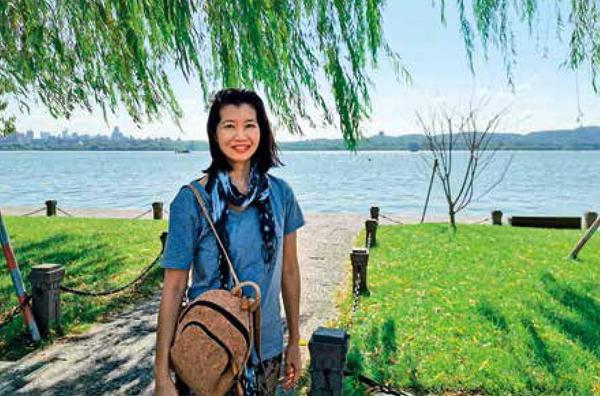我来自泰国,是“正”字辈
2020-02-14朱正珍

作为一名在泰国出生长大的华裔,我到杭州参加中国青年汉学家研修计划有什么意义呢?我想谈一点感想。
第一,姓名。我们的姓是从祖先传下来,我名字中有个“正”,这是爷爷给我起的,因为按照家谱上的排列,我这一辈就是“正”字辈。中国人的姓可以代表一个家族,每一个姓都有着悠久的历史与故事。
第二,沟通方式。语言相通且彼此有共同的话题。我在北京参加曼谷中国文化中心举办的优秀学员访华计划时,结识了一位活动志愿者,她叫席欣娟,是一位北京的大學生。此后,我们成为了朋友,并一直保持着联系,这次我知晓这个活动,正是源于她的介绍。申请后我一直期待着杭州的项目能够选择我,最终我如愿以偿。由于参加了研修活动,我的微信朋友增加了不少。
除了和南美、中东、欧洲、俄国、朝鲜同学们相处以外,我感觉和中国的大学志愿者朋友们交流很有趣,我很珍惜和他们聊天的时光。落地上海那个晚上,我坐车从上海的机场到杭州的酒店,路上我一直在和志愿者聊天。这让我觉得很有意思也很愉快。我认识了可爱的绍兴人任宁、上海人石赟、丽水的小姑娘蓝婷婷。温州人林煜是法律专业的学生,在上海参观、坐车的间隙,他还唱了好些粤语歌给我听。还有随行的一同去上海的温州人缪慧男,她在车上也和我一起唱流行歌。她是个乐于助人的好姑娘,在写这篇文章的过程中,她还帮我作了些修改。丽水龙泉人柳艳宏,我有次把雨伞忘在教室了,我便发微信给她,她找到雨伞后带来酒店给我。还有我们的带队人陈婷,她来自江西抚州,会说粤语,跟她用粤语对话感觉好亲切。
这一路上,我遇到了很多朋友,他们都很好。他们中有些人一开始不太说话,如果没有人跟他们说话,他们也不太开口,只是看自己的手机。但是话题聊开后我觉得每个人都很好,特别是互加微信后,他们给了我很多帮助。有了这些朋友和这些让人温暖的经历,虽然这次活动只有我一人来自东南亚,但我也不觉得孤单。能遇到这些可爱的年轻朋友,我觉得很幸福。
不得不说的另一种语言是书画,我从泰国带来送给老师的国画小礼物,还偶然地上了新闻。艺术表达也给我加了分。
第三,家乡与家人。上海、杭州我都去过。西安与老成都感觉也不错,况且我也挺想去看兵马俑。但是说到首选,当然还是杭州,因为这里有我的家人。虽然上海也有家人,但由于时间比较紧,便不考虑了。在此,我很感谢举办方尊重我的选择。
对我来说浙江是比较熟悉的,虽然两年前我只是来过几天,但这是一种说不出来的感觉——浙江就如同我的家,虽然我未曾待过很久,未曾仔细观赏这里的景色,却并不像初到的游客那般激动,到处拍照。在我的父辈里,7个兄弟中有5个出生于杭州,他们从小就在杭州长大,并在此待了四五年。之后他们去了永康,又从永康经金华到重庆,过了七八年又回到上海。大姑妈、大伯父后来还回到杭州上大学,杭州的印象一直都伴随着他们。
因为在中国有亲人,我趁此次研修之行在中国过了一次节日。节日是中国人团圆的日子,有亲人们陪我过节,我心里感觉非常愉快。我有两年没见过姑姑和堂弟了,这次他们带我去知味观吃饭,去丝绸城逛街。堂弟还带我去看阿里巴巴的菲住布渴酒店。听说这是一家无人酒店,没有前台接待员帮助入住、退房或者回答客人问题,而是利用人工智能代替人与人之间的交往。不过我亲自去酒店看,我还是能感受到人情味,并非全部是冷冰冰的机器人。酒店里的餐厅和普通的餐厅一样,有正常的服务员,大厅还有一位前台。
第四,学习祖先的文化。我每天用中文进行沟通,并在我们的活动中体验中国的传统文化,比如我了解了“浙学”的内涵;我看到了生态文明与中国美丽乡村的发展;学习了中国底蕴深厚的书法文化等等。另外,我还前往中国茶叶博物馆、中国丝绸博物馆、杭州工艺美术博物馆参观。
第五,我与中国的渊源。我算是第三代华裔,祖父母外公外婆都是华人,我的堂兄弟姐妹分散在世界各地,这真是不可思议。
我的祖父母出生在清朝末年,在那个年代,中国经历了巨大变化:鸦片战争、辛亥革命、清朝灭亡……
新中国成立后,中国取得的成就很不简单,非常了不起,如果祖父还在,看到今日繁荣的中国,我想他会很开心的。
这次,我在杭州停留的时间不短,我非常感谢中国文化和旅游部主办这次青年汉学家研修计划活动,让我感受到中国丰富的文化;我还要感谢所有组织、承办单位;也感谢能有这次写作的机会,让我表达个人的体会与感受。
作为一名外国人,我希望中泰两国能继续合作、共同发展。
I am a Chinese descendant born in Thailand. I can feel how people around me have changed their view of China. For example, I now hear people say openly and proudly they have Chinese blood in them, even though some dont have it. However, in a not so distant past, I hardly hear people with their ancestral roots in China hardly admitted that they were Chinese descendants. It wouldnt take a rocket scientist to figure out why.
As a Chinese descendant, I am taking part in a study program for young sinologists in Hangzhou. I would like to share some of my thoughts about why I think this program is important to me.
Firstly, my name. My Chinese name is 朱正珍or Zhu Zhengzhen in Pinyin. The Chinese surname Zhu came from our forefathers. In my given name Zhengzhen, Zheng is a word for my generation. All the people in my generation of the Zhu clan have this character as the first character in their given names, as stipulated in the Zhu clan family book. In China, every surname has a long history and many stories.
Secondly, the Chinese language. We speak the same language, which makes it easy for me to communicate with colleagues in this program. I met Xi Xinjuan while taking part in a program at China Cultural Center in Bangkok. She is a volunteer working for that program and student of Peking University. We became friends and have kept in touch since then. I learned from her about this young sinologist program in Hangzhou. I applied to this program and believed I would be selected. My wish was fulfilled. Now I am in this program in Hangzhou and my friends on WeChat have increased by a great number. Among my classmates in this program are students from South America, Middle East, Europe, Russia and DPRK. I have made friends with them. And I have also made friends with Chinese volunteers working for this program. I cherish chatting with them.
Talking about language and communication, I must mention calligraphy and painting. I brought some of my artworks to Hangzhou and presented them as gifts to my teachers. What I did was covered in a local television news report.
Thirdly, home and family members. The questionnaire I answered in this study program asked about which city in China would be my first choice. I have visited Shanghai and Hangzhou. Xian and Chengdu sound fascinating, but I picked Hangzhou simply because I have relatives in Hangzhou. I have relatives in Shanghai, but I have no time to visit them as I am busy with this program. I would like to thank the organizers of the program for their respect of my choice.
I am relatively familiar with Zhejiang. I spent a few days in Zhejiang two years ago. But there is something so dear and so touching about Zhejiang that words simply fail me. Zhejiang is like my home, though I have never stayed here for a long time and I have never had a chance to enjoy sightseeing around the province. My father has six brothers. Five of them were born in Hangzhou and grew up in the city. After four or five years in Hangzhou, they went to Yongkang and then fled to Chongqing via Jinhua. They stayed in Chongqing for seven or eight years before they came back to Shanghai. My aunt and uncle went to a university in Hangzhou. They cherish the impressions of Hangzhou after so many years.
As I have relatives in China, I have celebrated a festival with them during this program. I was very happy. I hadnt seen my aunt and my cousin for two years. They treated me to a banquet at Zhiweiguan Restaurant. We did shopping at China Silk Plaza. My cousin took me to FlyZoo Hotel operated by Alibaba. It is a hotel where no real receptionists check you in or out. If I have any questions, I get answers from AI equipment. I looked around and didnt feel it was a place manned by cold robots. The restaurant of the hotel is just like a normal restaurant where there are waiters and waitresses and a receptionist at the door of the restaurant.
Fourthly, our ancestors culture. in this program, I speak Chinese every day and experience the essence of traditional Chinese culture. For example, I have learned about the guiding philosophy in the words and deeds of our ancestors in Zhejiang: pragmatism, courage to face the world and look into our heart and soul, sincerity and honesty, balance between pursuit of justice and pursuit of individual interests, tolerance, innovation, and eagerness to be best. I have glimpsed into the ecological improvement and rural reconstruction in China. I have taken lessons in Chinese calligraphy. I have visited China National Tea Museum, China National Silk Museum, Hangzhou Arts and Crafts Museum.
Fifthly, my bond with China. I am a third-generation Chinese descendant. My four grandparents were all Chinese and my cousins are all over the world. It is incredible.
My paternal grandparents were born in the last phase of the Qing Dynasty. So much happened during this historical period: the opium wars, the 1911 Revolution, the demise of the Qing Dynasty, the rise and fall of the Northern Warlords Government, the Northern Expedition, and Chinas War of Resistance against Japanese Aggression, just to name a few. My grandfather was in the Northern Expedition Army and attended the First National Congress of Kuomintang. After Chinas War of Resistance against Japanese Aggression broke out on a full scale, the provincial government relocated from Hangzhou to Yongkang where he was the county governor. He assumed some important government positions afterwards. Since 1949, China has made great progress. I believe my grandfather would be truly happy if he were still alive today.
Id like to express my gratitude to the Ministry of Culture and Tourism for my participation in this program in Hangzhou and for the opportunity to learn more about Chinese culture. Id like also to say thank you to organizers and all institutions for making it happen and for this opportunity to write about how I feel about this program, about my visit to China. As a foreigner, I sincerely hope that China and Thailand will continue to cooperate for mutual development.
